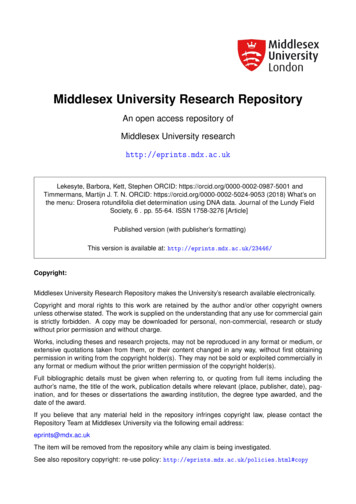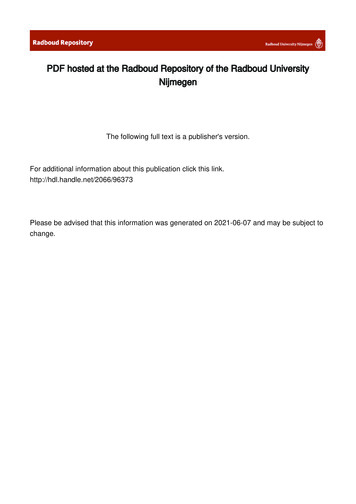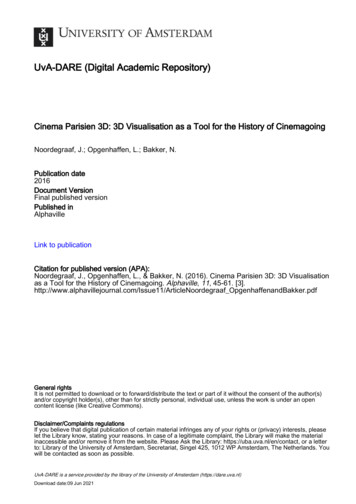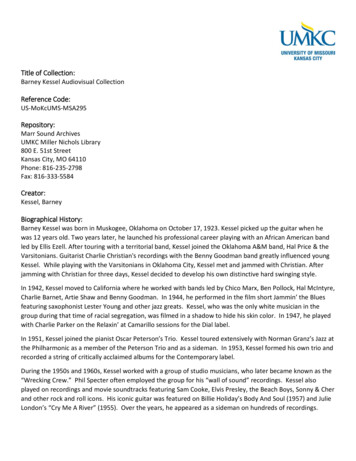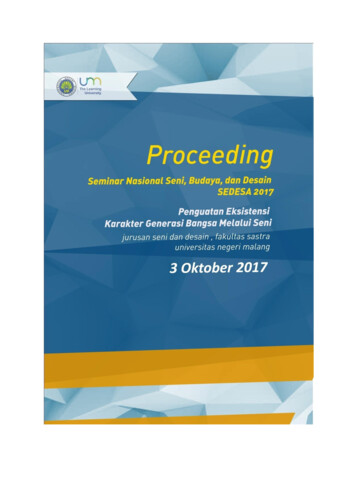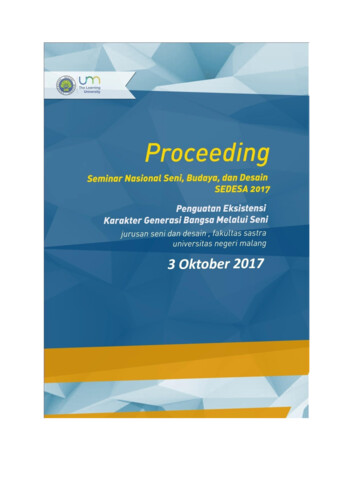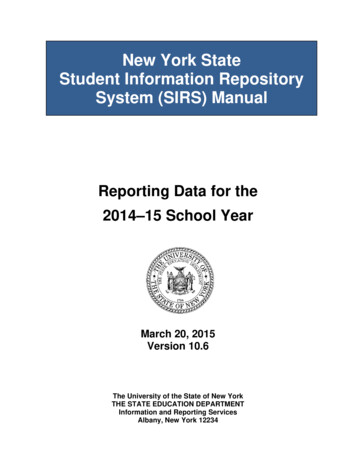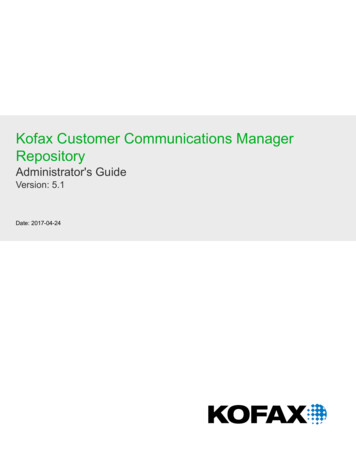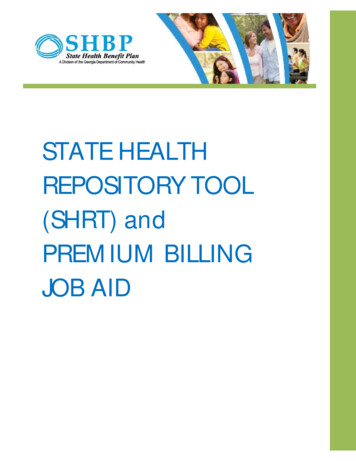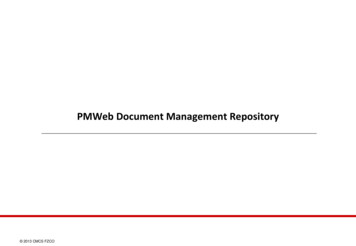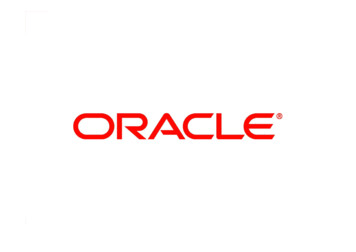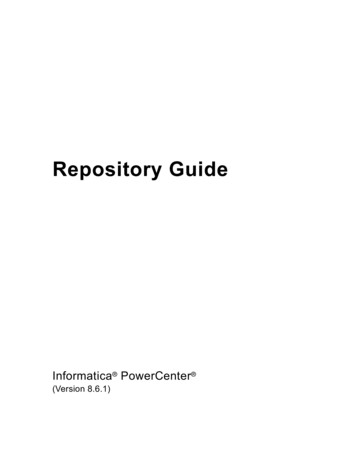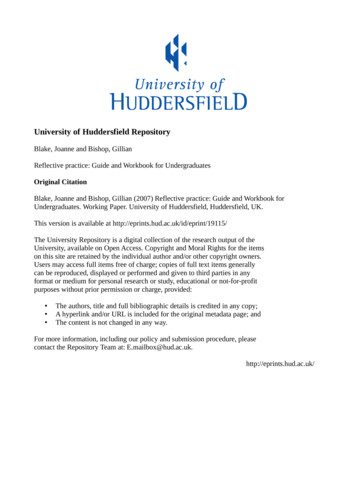
Transcription
University of Huddersfield RepositoryBlake, Joanne and Bishop, GillianReflective practice: Guide and Workbook for UndergraduatesOriginal CitationBlake, Joanne and Bishop, Gillian (2007) Reflective practice: Guide and Workbook forUndergraduates. Working Paper. University of Huddersfield, Huddersfield, UK.This version is available at http://eprints.hud.ac.uk/id/eprint/19115/The University Repository is a digital collection of the research output of theUniversity, available on Open Access. Copyright and Moral Rights for the itemson this site are retained by the individual author and/or other copyright owners.Users may access full items free of charge; copies of full text items generallycan be reproduced, displayed or performed and given to third parties in anyformat or medium for personal research or study, educational or not-for-profitpurposes without prior permission or charge, provided: The authors, title and full bibliographic details is credited in any copy;A hyperlink and/or URL is included for the original metadata page; andThe content is not changed in any way.For more information, including our policy and submission procedure, pleasecontact the Repository Team at: E.mailbox@hud.ac.uk.http://eprints.hud.ac.uk/
ReflectivePracticeGuide and Workbook for UndergraduatesThe Business SchoolPrepared by Joanne Blake and Gill BishopSupported by Higher Education Innovation Funding2007/8
ContentsPageSection One - The purpose of the guide2Section Two - Where am I now?2.12.2Evaluation of skills in the workplaceKnowing your strengths and recognising areas for development36Section Three - Learning and learning styles3.13.23.33.4Definitions of learningThe learning processLearning stylesYour preferred learning style7789Section Four - Reflective practice4.14.24.34.44.5What is reflection?What reflective writing is notStarting your reflective journeyDeveloping deeper reflectionModels of reflection1010111213Section Five - Reflecting on individual or group courseworkSection Six – Reflection for work based learners20Section Seven - Reflection as a tool to help with employabilitySection Eight - Supporting the processSection Nine- Summary20References22Appendices23Feedback sheet211 WBL Assessment and Credit Project February 2008
1.0The purpose of the guide – what it sets out to doThe aim of this guide is to: Engage students in the reflective process to encourage professional and personaldevelopment Help you to understand the importance of reflection and help you to practise using variousmodels of reflection Allow students to explore their work experiences and to make sense of them in the contextof academic theory and contemporary thinking Assist students blend their structured learning experience with their unstructuredexperiences in life and their working environmentLearning is the mental oxygen for the professional and personal growth. Understanding ourlearning processes, reflecting on learning, analysing the outcome of our action and planning foraction promotes personal learning.This guide is designed for undergraduate intermediate year to encourage reflection not only fromacademic work but also from the workplace which may help develop links between academictheory and practice based learning. Additionally it is a resource for staff involved in supporting anddeveloping students.This guide has been prepared as a working document to support your learning through the processof reflection. You are encouraged to complete the activities which will enable you to find a stylebest suited to you in developing your learning for future career and employability.The remainder of the guide is divided into the following sections:Section 2Skills assessment. By considering your current skills this will help you focus on yourprevious experiences in order to complete a personal SWOT analysis and facilitatea plan for improvement.Section 3The Learning Process. In which you consider your own learning style andunderstand how this can help with strategies for future development.Section 4Developing Reflection. Includes examples of how you may record your reflectionsby working through a number of activities to start you on this journey.Section 5Section 6Reflecting on courseworkReflection as a means of enhancing employability. This section enables you toconsider why understanding how we learn and reflect is relevant to your module andyour future employability.The guide concludes with a summary of the role of key stakeholders involved, that is you, the tutorand the employer.Reference is made to the QAA t.asp) which represent a comprehensive outline of the skills, and competencies required by agraduate which include: problem solving, decision making, communication, team working, cognitiveskills, self awareness and self reflection among others.We hope you find the guide of practical benefit. You can feedback any comments using thefeedback sheet attached to the back of this booklet.2 WBL Assessment and Credit Project February 2008
2.0Where am I now?2.1 Skills EvaluationA good starting point is to consider your current skills level. The purpose of this activity is to help you audityour skills and provide examples of where and how you have developed the skill. There is also a blank boxfor you to complete for skills that are not listed but for which you have evidence of. You may find it helpful torefer to appendix one which has a further list of skills which you may consider.For each of the on skills overleaf use the key to rate your current level from 1 – limited experience to 4 – astrength area. Answer as honestly as you can and provide examples from your workplace and your course.3 WBL Assessment and Credit Project February 2008
1. Limited experience of this2. Able to do this with some help3. Competent in this area4. This is a strength area1 2 3 4 JustificationMANAGEMENT of SELFUse, evaluate and adapt a range of academicskills (analysis, evaluation, argument)Manage your time effectively (meetdeadlines, get to appointments/classes ontime)Set realistic objectives, priorities & standardsMonitor, evaluate and adapt ownperformanceRespect the views of othersTake responsibility for acting in aprofessional/ethical mannerDeal with criticism constructivelyMANAGING YOUR LEARNINGTake responsibility for your own learningMonitor your own performanceSet realistic targets and plan how these willbe metDemonstrate an awareness of learningprocessesSelect different methods of learningUse learning in new or differentsituations/contextsSeek information from appropriate people4WBL Assessment and Credit Project February 2008
PROBLEM SOLVINGThink laterally about the problemIdentify options and suggest possiblesolutionsPlan and implement a course of actionMonitor evaluate and adapt solutions andoutcomesApply ideas and knowledge to a range ofsituationsTake responsibility for individual and groupdecision makingCOMMUNICATIONPresent oral/visual information competentlyListen actively and effectivelyTake part in a discussion, to put your ownviewpoint across and to listen and respond toothersOffer constructive criticismSpeak fluently and confidently to a variety ofaudiencesProduce a variety of written documentsUse written documents to support your verbalcommunicationEvaluate and adapt strategies forcommunication5WBL Assessment and Credit Project February 2008
WORKING WITH OTHERSPlan work with others, agreeing objectivesand responsibilitiesRespect the views and values of othersAdapt to the needs of the group/ team (takeinitiative, lead, delegate, stand back,negotiate etc)Assist and support others in learningNegotiate with individuals/groupsWork to collective goalsMonitor, evaluate and assess processes ofgroup/ team workDATA HANDLINGUse appropriate sources of information(library, retrieval systems, IT, people etc )Use appropriate technology and mediaincluding ITHandle volumes of information and dataeffectivelyRecord and interpret results / dataInterpret a variety of information formsUse appropriate numerical informationEvaluate and adopt strategies for handlingdata and information6WBL Assessment and Credit Project February 2008
1. Limited experience of this2. Able to do this with some help3. Competent in this area4. This is a strength area1 2 3 4 JustificationOther skills (refer to appendix 1 for examples of skill types such as vocational/occupational skills)7WBL Assessment and Credit Project February 2008
2.2Knowing your strengths and recognising areas for developmentThe purpose of the activity is to enable you to consider those skills and personal qualities which you havedeveloped through your experiences at college, University, work and socially in order to identify those whichrequire further development. You may wish to discuss opportunities for development with your tutors ormanagers/supervisors at work.Evaluate the results from the previous exercise to identify where your strengths and weaknesses lie and toconsider ways in which you can develop those areas where you have limited experiencePersonal StrengthsEvidenced byAreas less developedOpportunities for developmentRemember this is not just about skills and abilities this is about personal competencies which may or maynot be developed whilst pursuing a course of study, development or within the workplace but we use theseskills in other aspects of our life for example coaching our children’s football team or organising a charityevent or even a day out or holiday.In addition, make use of feedback from assignments, group activities and appraisal feedback to evidence,evaluate and support your statements.Using a critical friend - What do others think of your strengths and areas for developmentEither in your course groups, social groupings or work teams be prepared to support your peers/ colleaguesin evaluating their skills, personal and professional qualities and areas for development using the sametemplate as above8 WBL Assessment and Credit Project February 2008
3.0Learning and Learning StylesThis section is to help you firstly consider how you learn and why it is important to understand your individuallearning process; to then evaluate what you have learnt and finally record this in order to improve yourknowledge and understanding of how we grow and develop in the workplace.This section will provide you with some examples of how to record learning in your portfolio to supportcontinued professional development.3.1 Definitions of Learning“The process of making a new or revised interpretation and meaning of an experience, which guidessubsequent understanding, appreciation and action” Mezirow (1990)Learning at workKnowledge is generated through work and all workplaces are potential sites of knowledge production” Boud(2003 WBL a new HE?)3.2 The Learning ProcessHow do we learn?It is important to recognise how we individually learn before we embark upon the process of reflection. We alllearn in different ways, some of us like to actively take part and learn from the experience whilst others like toread and prepare well before they learn. Honey and Mumford ( ) suggest that .Kolb ( ) suggests that thereKolb & Fry (1975)Whichever way we learn an important stage in our learning is the process of reflection.“Experience may underpin all learning but it does not always result in learning. We have to engage with theexperience and reflect on what happened, how it happened and why. Without this the experience will tend tomerge with the background of all the stimulants that assail our senses every day.” Beard & Wilson (2006)9 WBL Assessment and Credit Project February 2008
3.3 Learning styles according to Honey and MumfordYou will have probably already completed an activity that helps you identify your learning style preferences.This may have been Honey and Mumford a summary of which is included below.Peter Honey and Alan Mumford have identified four main learning style preferences. By thinking about yourpreferred style, you can try and apply this to learning new things. If you're able to use your natural style,you're likely to find learning much easier and quicker.Further details and an explanation of situations in which the styles best learn in found in appendix ivists like to be involved in new experiences. They are open minded and enthusiastic about new ideas butget bored with implementation. They enjoy doing things and tend to act first and consider the implicationsafterwards. They like working with others but tend to hog the limelight.Reflectors:Reflectors like to stand back and look at a situation from different perspectives. They like to collect data andthink about it carefully before coming to any conclusions. They enjoy observing others and will listen to theirviews before offering their own.Theorists:Theorists adapt and integrate observations into complex and logically sound theories. They think problemsthrough in a step by step way. They tend to be perfectionists who like to fit things into a rational scheme.They tend to be detached and analytical rather than subjective or emotive in their thinking.Pragmatists:Pragmatists are keen to try things out. They want concepts that can be applied to their job. They tend to beimpatient with lengthy discussions and are practical and down to earth.10 WBL Assessment and Credit Project February 2008
3.4 What is your preferred learning style?Now you have considered your learning style, note in the table below what is your most dominant learningstyle with examples to illustrate when you have used this style. Consider the advantages and disadvantagesfor you of being aware of your learning style preference at a personal level and organisational level. Youmay find it useful to refer to the work of Honey and Mumford’s learning styles detailed in appendix 2 tosupport this activityPreferred Learning StyleEvidenced byAdvantages of using this styleDisadvantagesLeast preferred Learning StyleEvidenced byAdvantages of using this styleDisadvantagesConsider the implications of this for you in the workplaceAction plan11 WBL Assessment and Credit Project February 2008
4.0Reflective practiceReflective practice is an evaluative tool as part of the learning process associated with personaldevelopment and growth. Having an experience does not necessarily mean that learning has taken place, itis only through internalising the experience that you can then begin to make sense of the experience in orderfor it to help with future action. This section aims to introduce you to a range of techniques to help you onyour journey to becoming a reflective learner. It is also useful to consider what is not reflection and we haveprovided you with some examples of this to help you.4.1 What is reflection?Reflective learning is the process of internally examining and exploring an issue of concern triggered by anexperience which creates and clarifies meaning in terms of self and which results in a change conceptualperspective. Boyd and Fales (1983)4.2 What reflective writing is not.Reflection is not: Conveyance of information, instruction or argument in a report, essay or ‘recipe’; Straightforward description, though there may be descriptive elements; A straightforward decision e.g., about whether something is right or wrong, good or bad etc.; Simple problem solving like recalling how to get to the nearest station. Moon (2004)Initially you may find yourself writing in a descriptive style, simply re-stating facts of the event. By using theframeworks within the workbook this should enable you to move from story telling to writing accounts ofevents which show what you have learnt and how you plan to take that learning forwardReflective Processes – a model including skills required for reflectionAwareness of uncomfortable feelings and thoughtsSelf awarenessDescriptionCritical analysis of feelings and knowledgeCritical AnalysisSynthesisNew perspectiveEvaluationSource: Atkins, S. Murphy, K (1993)12 WBL Assessment and Credit Project February 2008
4.3 Starting your reflective journeyReflective JournalsReflective journals are personal and unstructured (Bolton 2001) and contain stories, descriptions of events,personal anecdotes but should also contain deliberate thought and analysis. Often individuals find thatkeeping a personal reflective journal of events that happen either in the workplace or outside of theworkplace helps them to reflect and understand situations, particularly as to why they happen and what theymight have been able to do different to effect a more satisfactory result. Alternatively when things go well it ishelpful to record this and work out why this was a positive experience and what can be learnt from this totransfer positively to other situations.Sometimes these are called reflective logs or diaries but it is important to recognise that the journal shouldnot simply be a personal diary or just a story but should explore your actions, feelings and the learning thatwas derived from the experience. A reflective diary can help us challenge our own beliefs and values andhelp us to clarify issues that are bothering us in order to deal with the issue and move on.Moon (2006) provides a range of advice from Gibbs (1988) and Walker (1985) when maintaining yourjournal:Make the journal your ownensure the journal is ‘an extension of yourself, not something outside of you’Walker (1985)Be honest‘you can only learn from your journal if you have enough courage to faceyourself as you really are’ Gibbs (1988)Let words flow‘Get down to it . write, write, write . Let it flow, uncensored and inwhatever order it comes. It is very useful simply to write and then to reflecton what has been written’ Walker (1985)Use your own words‘use simple English that makes you realise exactly what you meant whenyou review your journal’ Gibbs (1988) ‘Say what you feel and if that makesyou feel guilty, record that and work with it further’ Walker (1985)Dig deeper‘urge yourself to keep digging deeper and deeper so that you canunderstand and use your understanding’ Gibbs (1988)Be flexible‘do not be rigid in the way you keep the journal be prepared to trydifferent methods so that you can mould this exercise to your personaltalents and needs’ Walker (1985)Write things up assoon as you canSeek help if necessary‘there is a very definite advantage in being able to record things as quicklyas possible, even thought one may not immediately write them up fully’Walker (1985)‘feel free to seek help . From others: fellow participants, or other people ’ Walker (1985)Source: Moon (2006)Your journal can take any format that you prefer – handwritten, audio recorded, electronic through thepersonal section of your e-portfolio or personal blog. Your preference may link to your preferred learningstyle.13 WBL Assessment and Credit Project February 2008
Activity 1Read the three extracts in Appendix 3 which provides some working examples of reflecting on an event.Using the table below, identify which sections of the accounts are reflective and list these under theappropriate heading. What does this tell you about reflective practice and how will you help you improveyour own reflective journals. Your tutor or an academic skills tutor will then provide feedback for you.The park 1The park 2The park 3Action points to improve writing reflective journals4.3 Developing deeper reflectionLevels of ReflectionHatton and Smith (1995) suggest there are 4 levels of reflective activity. These are:Descriptive writingDescribing an event or activity with no attempt at an explanationDescriptive reflectionReflecting on an activity with an attempt to provide a possible explanationDialogic reflectionReflecting on the issue over time, inner dialogue, investigating various solutions andassumptionsCritical reflectionConsidering the wide aspects including historical and cultural aspectsInitially, when starting the reflective writing process you may find yourself writing in a purely descriptive style.You should then re-examine your previous thoughts and writing in order to question further, understand whatwas happening at the time and thus move to the next level of the above scale.At an undergraduate level, you will find with practice that you are able to move onto the second stage.14 WBL Assessment and Credit Project February 2008
4.5 Models of reflection and activitiesTwo models of Reflective Practice are detailed below which you may find useful in your work. After theexplanation of each model we suggest you complete the activity related to the model. These are of coursenot the only models and you may find something through your reading which you prefer to use.4.5.1 Gibbs reflective cycleGibbs suggests it helpful to think of reflection in a cyclical manner whilst Rolfe provides us with a toolkit ofreflexive practice. We would recommend you complete the activities on the following pages to develop yourskills in using reflective practice to support deeper levels of learning.GIBBS REFLECTIVE CYCLE(Gibbs 1988)Work through the activity on the next page to practice using this framework.It may help to structure your approach by going through each of these stages and asking yourself thequestions at each stage.15 WBL Assessment and Credit Project February 2008
4.5.1.1 Activity 2Looking back over your last working week, take one experience that stands for you, this can be eitherpositive and negative, and using Gibbs reflective cycle: describe the event, explain your feelings at the time,evaluate and analyses the experience and finally draw up and action plan.Event DescriptionSet the context of theevent for examplewhere were you, whowere there, whathappened, what did youand others do?FeelingsHow you were feelingand thinking about; howdid other people makeyou feel; how did youfeel about the outcomeof the event; what doyou think about it nowEvaluationTry to evaluate or makea judgement What wasgood about theexperience and whatwas bad about theexperience or didn’t goso wellAnalysiswhat went well; what didyou and others do well;what went wrong or didnot turn out how itshould have done; inwhat way did you orothers contribute to thisConclusionIt is here that you arelikely to develop insightinto you own and otherpeople’s behaviour interms of how theycontributed to theoutcome of the eventAction PlanEncountering the eventagain, what you woulddo – would you actdifferently or would yoube likely to do thesame? Why?16 WBL Assessment and Credit Project February 2008
4.5.2 Rolfe et al (2001) Framework for reflexive practiceRolfe et al (2001) propose a framework that uses Borton’s (1970) developmental model. The questions‘What? So what? and now what? can stimulate reflection from novice to advanced levels.Descriptive level of reflectionTheory and knowledge - buildinglevel of reflectionAction-orientated (reflexive)level of reflectionSo whatNow what does this tell me/teachme/imply/mean aboutme/others/our relationship/ myattitudes/others’ attitudes, etc.? do I need to do in order tomake things better/stop beingstuck/resolve thesituation/feel better/get onbetter/etc., etc.?What is the problem/difficulty/reason for being stuck/reasonfor feeling bad/reason wedon’t get on/etc., etc.? was my role in the situation? was I trying to achieve? was going through my mind as Iacted? actions did I take? did I base my actions on? was the response of others? other knowledge can I bring tothe situation?· experiential· personal· scientific were the consequences· for myself? for others? feelings did it evoke· in myself? in others? was good/bad about theexperience? broader issues need to beconsidered if this action is tobe successful? might be the consequencesof this action? could/should I have done tomake it better? is my new understanding of thesituation? broader issues arise from thesituation?4.5.2.1 Activity 3Taking the same experience that you have explored through the Gibbs reflective cycle, now apply Rolfe’smodel.Description level of reflectionTheory and Knowledge – buildinglevel of reflectionAction Orientated (reflexive) levelof reflectionWHATSO WHAT?NOW WHAT?17 WBL Assessment and Credit Project February 2008
4.5.3 Activity 4 Summarise your key learning pointsWhat have I learnt from these exercisesWhat works for me and whyAction planning: what do I still need to know and what actions do I take forward“Reflection is a complex process which many learners do not findeasy and facilitating learners’ reflection requires sophisticatedpedagogy” Walsh (2007)What we can conclude from this is that the ability to write in a reflective manner is something that isdeveloped over time and need18 WBL Assessment and Credit Project February 2008
5.0Reflecting on individual or group courseworkActivity 5Reflecting on coursework should become a regular learning process whereby again you can use aframework for reflection in exploring what you have learnt, what you did well, what could be improved uponand what you will take forward. Work your way through the questions below in considering a recent piece ofwork that you have undertaken.What did I actually achieve with this piece of work?Which were the most difficult parts, and why were they difficult for me?Which were the most straightforward parts, and why did I find these easy?How well do I think I achieved the intended learning outcomes for this task?Where could I have improved my achievement?Why didn't I improve it at the time?What have I got out of doing this assignment?How have I developed my knowledge and skills?How do I see the payoff from doing this assignment helping me in the longer term?What else have I got out of doing this assignment?Have I developed other skills and knowledge, which may be useful elsewhere at another time?If so, what are my own emergent learning outcomes from doing this assignment?What was the best thing I did? Why? How do I know?What worked least well for me? Why did this not work well for me?What have I learned about myself from this not having worked well for me?Do I feel that my time on this assignment has been well spent? If not, how could I have used my time moresensibly? Which parts of the assignment represent the time best spent? Which parts could be thought of astime wasted?19 WBL Assessment and Credit Project February 2008
What do I plan to do differently in future as a result of my answers to the above questions?With hindsight, how would I go about this assignment differently if doing it again from scratch?To what extent will this assignment influence the way I tackle anything similar in future?What can I do to improve my performance when next meeting this particular sort of challenge?What advice would I give go a friend about to start on the same assignment?What pitfalls would I advise to be well worth not falling into?Overall, how has this assignment helped (or hindered) my motivation to learn more about this part of mysyllabus? Has it encouraged me, or disillusioned me?To what extent has this assignment helped me to clarify what I need to learn about this topic?Questions to consider before receiving feedbackHow useful do I expect the feedback to be, that I receive on my efforts for this assignment?What sorts of feedback do I really want at this point in time?What sorts of feedback do I really need at this point in time?Questions to consider after receiving feedback from the courseworkHas it been worth the effort I put in?Do the marks represent a just reward?Should this assignment be worth more or less marks in the overall scheme of things?20 WBL Assessment and Credit Project February 2008
6.0Why is this important for work based learning students?The need to reflect upon the practice of work based learning and use the process to identify strengths,weaknesses and actions to be taken from your experience is relevant when seeking work. Through reflectivepractice you should be able to answer most effectively questions at the interview and create a goodimpression.In the workplace, reflection may be stimulated by our response to specific situations; this might be triggeredby particular feelings such as: Feeling uneasy about somethingFeeling something is not rightFeeling that your existing knowledge is not appropriateFeeling you don’t know what to doFeeling that you have to do something differentlyOr this might be triggered by something significant that happened at work or even in class discussion aboutsomething that happened in the workplace. This is often known as a critical incident, such as: Something that went unusually wellSomething that went badly or lead to problemsSomething that you found especially demanding or challengingSomething that made a difference in your workActivity 6Using one of the models suggested above ( Rolfe or Gibbs) select one of the following subjects and write areflective account of what happened, what you felt, what you did and what you have learnt from this feeling orcritical incident that you would do differently next time.A conflictA moment of joyA misunderstandingAs missed opportunityAn extremity of emotionA dilemmaA celebrationA successEventReflective Account21 WBL Assessment and Credit Project February 2008
7.0 Reflection as a tool to help with employabilityActivity 7Consider the questions below, these are the types of questions that employers may ask you at interview orat your performance appraisal meetings and they require that you provide examples of when you facedparticular situations and demonstrated particular skills.This activity is designed to help raise your self-awareness and improve your ability to articulate your skillsAchievement orientationMaintains and inspires a results-driven approach, focuses on results and critical performance indicators. Recall an important goal that you were set in the past. What strategies did you use to achieve it? What wassuccessful?
2.2 Knowing your strengths and recognising areas for development The purpose of the activity is to enable you to consider those skills and personal qualities which you have developed through your experiences at college, University, work and socially in o
